Packages for local governments to comply with the new system of technical intern trainees
Index
- Packages for local governments to comply with the new system of technical intern trainees
- Japanese language study for caregiver trainees (preparation courses for the National Caregiver Examination and the Japanese Language Proficiency Test)
- Japanese language study for foreign agricultural technical intern trainees
- Building cleaning Japanese language study for technical intern trainees
Packages for local governments to comply with the new system of technical intern trainees
Foreign Workers in Japan and the Proposed Alternative System to Technical Internship
As for the industrial breakdown of workers, approximately 1.05 million were employed in the manufacturing, wholesale, retail, lodging, food services, and construction industries, and it goes without saying that foreign workers are an indispensable part of the Japanese economy. Foreign technical intern trainees were the bearers of this indispensable labor. According to the Immigration and Immigration Control Agency, the number of technical intern trainees will peak in 2020 at 378,200, which is more than double the number in 2011, when the technical intern training system was launched.
However, the technical internship system has many problems, such as the poor working environment and the financial burden of having to come to Japan with debts, and the system has been under constant review.
Therefore, discussions are currently underway to abolish the technical internship system and introduce a new system starting in 2024.
Key Points of the New System
- passing each level of the Japanese Language Proficiency Test is required to change jobs after one year of employment.
- Japanese language proficiency, which was not required in the past, will be required under the new system.
Attain will provide total coordination to help each individual steadily improve their Japanese language skills in light of this situation.
Features of Attain's Japanese e-Learning
Video materials that you can understand by watching and listening! Learn in your native language!
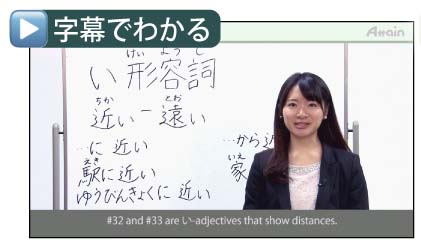 Attain's Japanese e-Learning materials are available with subtitles in English, Chinese, Vietnamese, Indonesian, Myanmar, Portuguese, Mongolian, Russian, Tagalog, Korean, and Thai. More languages will be added in the future. The service has been well received for its ease of learning in one's native language.
Attain's Japanese e-Learning materials are available with subtitles in English, Chinese, Vietnamese, Indonesian, Myanmar, Portuguese, Mongolian, Russian, Tagalog, Korean, and Thai. More languages will be added in the future. The service has been well received for its ease of learning in one's native language.
 Attain's Japanese e-Learning materials are available with subtitles in English, Chinese, Vietnamese, Indonesian, Myanmar, Portuguese, Mongolian, Russian, Tagalog, Korean, and Thai. More languages will be added in the future. The service has been well received for its ease of learning in one's native language.
Attain's Japanese e-Learning materials are available with subtitles in English, Chinese, Vietnamese, Indonesian, Myanmar, Portuguese, Mongolian, Russian, Tagalog, Korean, and Thai. More languages will be added in the future. The service has been well received for its ease of learning in one's native language.
Even beginner learners can feel at ease! A structure that allows you to learn hiragana step by step, starting with the 50 hiragana syllables.
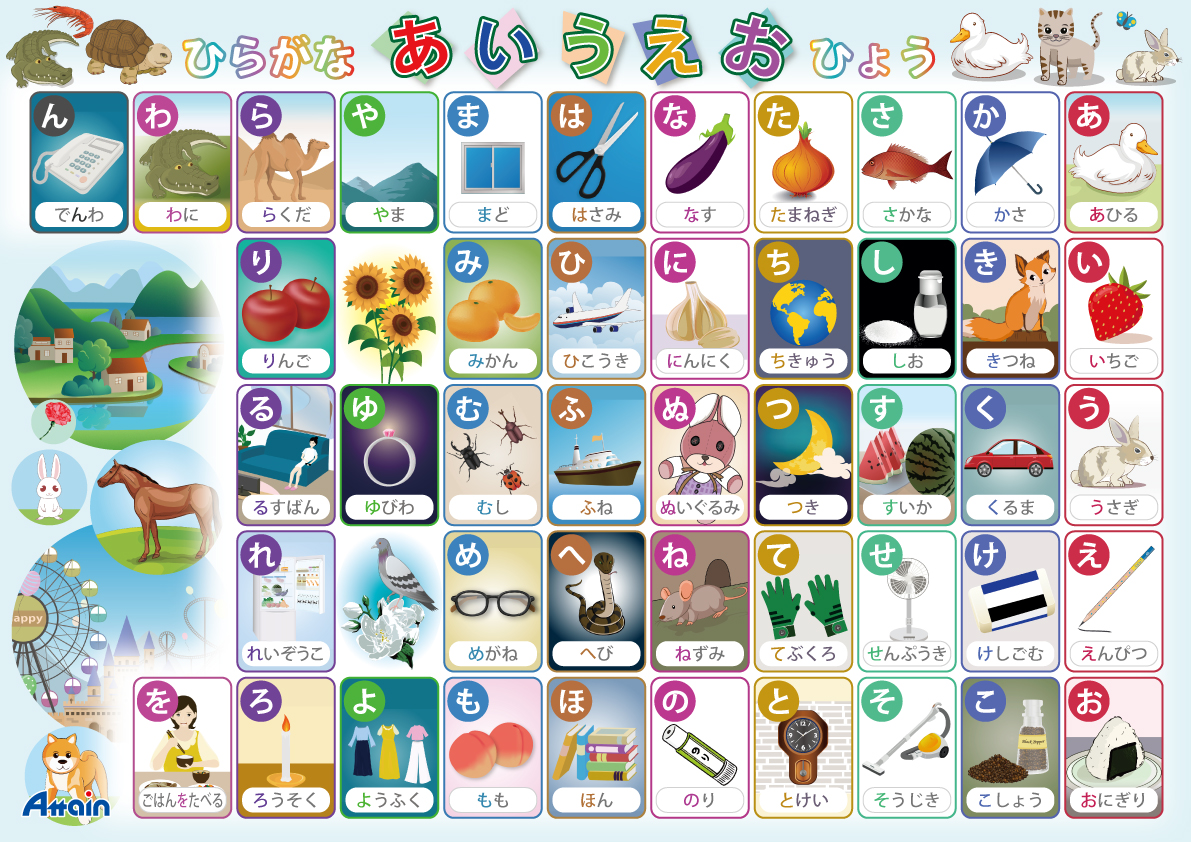 Designed so that even complete beginners can study step by step on their own. Starting with hiragana and katakana, you can prepare for the Japanese Language Proficiency Test.
Designed so that even complete beginners can study step by step on their own. Starting with hiragana and katakana, you can prepare for the Japanese Language Proficiency Test.
 Designed so that even complete beginners can study step by step on their own. Starting with hiragana and katakana, you can prepare for the Japanese Language Proficiency Test.
Designed so that even complete beginners can study step by step on their own. Starting with hiragana and katakana, you can prepare for the Japanese Language Proficiency Test.Textbook PDFs are included for easy review
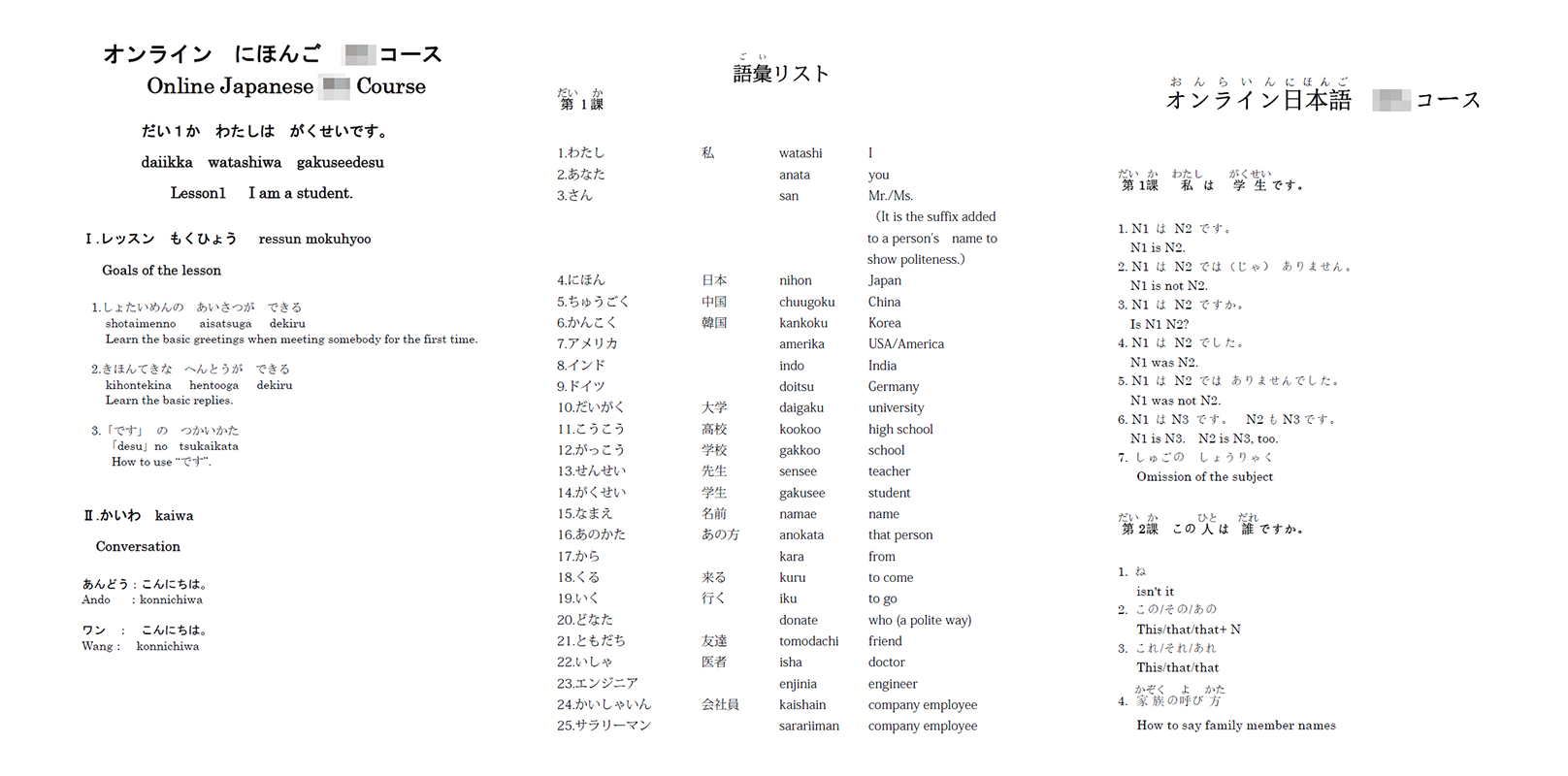 Supplementary materials are included with the course materials. By checking them as you watch, you can efficiently take revenge.
Supplementary materials are included with the course materials. By checking them as you watch, you can efficiently take revenge.
 Supplementary materials are included with the course materials. By checking them as you watch, you can efficiently take revenge.
Supplementary materials are included with the course materials. By checking them as you watch, you can efficiently take revenge.A full range of practice tests are also included
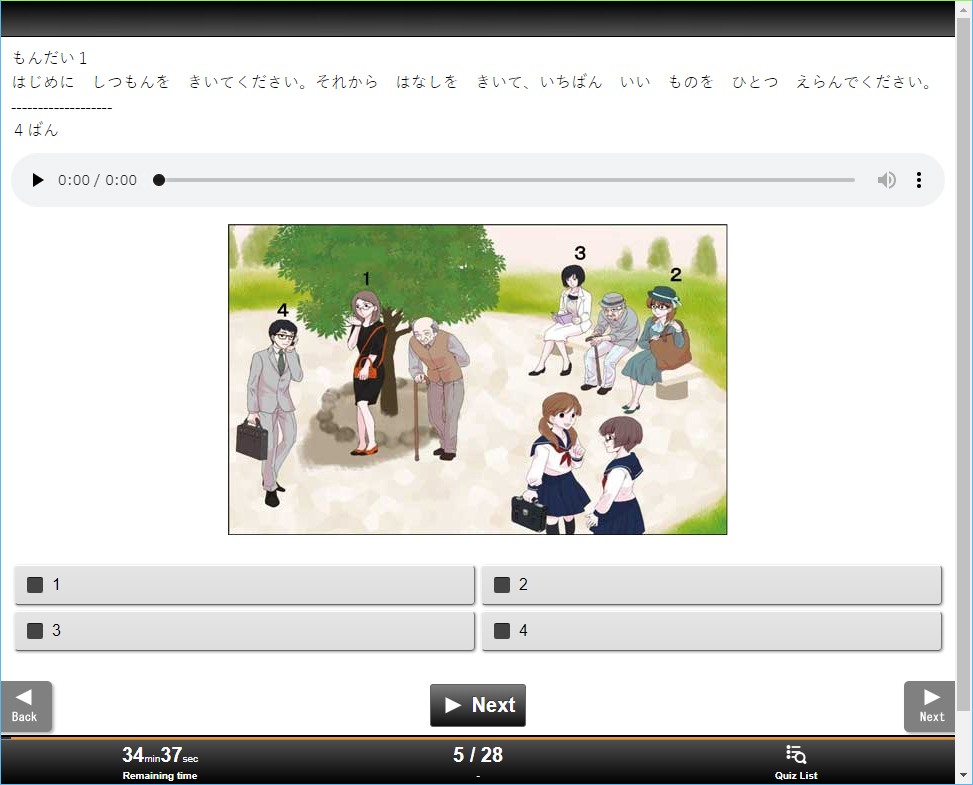 Included in the JLPT preparation materials are three original N5 and N4 practice tests each. This allows students to prepare for the exam in a practical format.
Included in the JLPT preparation materials are three original N5 and N4 practice tests each. This allows students to prepare for the exam in a practical format.
 Included in the JLPT preparation materials are three original N5 and N4 practice tests each. This allows students to prepare for the exam in a practical format.
Included in the JLPT preparation materials are three original N5 and N4 practice tests each. This allows students to prepare for the exam in a practical format.Online Learning System
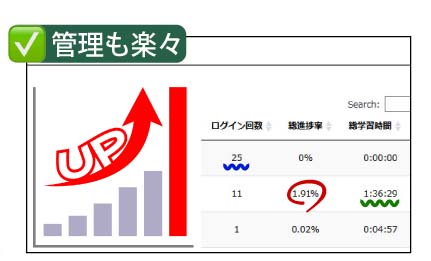 We issue administrator accounts so that you can check how much students are learning, their progress, and whether they pass or fail the test questions. Administrator accounts can also be issued based on the number of students.
We issue administrator accounts so that you can check how much students are learning, their progress, and whether they pass or fail the test questions. Administrator accounts can also be issued based on the number of students.
 We issue administrator accounts so that you can check how much students are learning, their progress, and whether they pass or fail the test questions. Administrator accounts can also be issued based on the number of students.
We issue administrator accounts so that you can check how much students are learning, their progress, and whether they pass or fail the test questions. Administrator accounts can also be issued based on the number of students.Details of the package for local governments
Basic Plan
Basic initial fee (initial setup): 100,000 yen
Annual system usage fee (course usage fee, server usage fee, technical maintenance fee)
Course available for up to 100 participants 12,000 yen per participant 1,200,000 yen per year
Optional Plans
1. 60-minute online live lessons
Live lessons will study one level per year.8,000 yen per class (up to 10 students per class) Once a week
Approximately 10-month plan. (38 weeks, taking into account summer and New Year holidays Total 304,000 yen)
2.missed recordings of online live lessons (consult separately)
We can also provide live lessons on demand. This is also available in the event of an unavoidable absence.3.support for administrators (consult separately)
We can also provide support for those who "don't know how to use the administrator account" or "want to know how to use it.4.learner support (consult separately)
We can also check the progress of learners and provide advice. We support effective operation of the system, not just the provision of teaching materials.Sample videos
https://www.youtube.com/playlist?list=PL8dhMOKO4oIcJP_lxAg30JMi8FidPCWIv
🎬N5 Kanji Course (English subtitled digest)
https://www.youtube.com/playlist?list=PL8dhMOKO4oIc0ERE84XYa_SEtx4S2R6IW
🎬NN5 Course (English subtitled digest)
https://www.youtube.com/playlist?list=PL8dhMOKO4oIfIe7XxG0sRUe4wv5YOZOXe
🎬N4 Kanji Course (English subtitled digest)
https://www.youtube.com/playlist?list=PL8dhMOKO4oIcujg_bycyWsCUdWlBoDGVG
🎬N4 Course (English subtitled digest)
https://www.youtube.com/playlist?list=PL8dhMOKO4oIdteGnmMdiUXJnB1-3IfmKA
*Please also see the catalog PDF file for an overview of our Japanese language materials.
Inquiry/Consultation
Japanese language study for caregiver trainees (preparation courses for the National Caregiver Examination and the Japanese Language Proficiency Test)

When accepting technical intern trainees for nursing care, a certain level of Japanese language proficiency is required, and thus a specific requirement is imposed on technical intern trainees who provide nursing care to pass an "N3" level test. However, we feel that there is a lack of information that not only provides Japanese language proficiency test materials for technical intern trainees who speak a different language, but also provides clear and specific examples of environmental and cultural differences.
In addition, the students must also learn the language used in the nursing care field and the contents of the preparation for the national examination for care workers, which places a heavy burden on the learners.
Therefore, we have developed a comprehensive Japanese e-Learning program to serve as a bridge for technical intern trainee education.
The e-Learning course materials are available at various levels, allowing those working in the welfare sector to study during their busy work schedule in order to pass the care worker exam. In addition, if you are a company or organization, we can issue an administrator account so that you can check the progress of your learners.
Course in production (Preparatory course for the national exam for foreigners who want to become care workers)
Basic (3 titles x 90 min.)
| vol. | Title | Content | Time |
|---|---|---|---|
| 1 | Basic Knowledge of Nursing Care 1 | Basic understanding of nursing care, welfare and medical care | 90 min. |
| 2 | Basic Knowledge of Nursing Care 2 | Basic Knowledge of the Mechanisms of the Mind and Body | 90 min. |
| 3 | Basic Knowledge of Nursing Care 3 | Life Assistive Technology Human and Society | 90 min. |
Examination Preparation Section (3 titles x 90 min.)
| vol. | Title | Content | Time |
|---|---|---|---|
| 1 | Guidance | Overview Test Summary / Kickoff Question / Who is in demand in the field? | 30 min. |
| 2 | Courses by subject group 1 | Basics of Human Dignity and Independent Care | 90 min. |
| 3 | Courses by subject group 2 | Relationships and CommunicationCommunication Technology | 90 min. |
| 4 | Courses by subject group 3 | Understanding Society | 90 min. |
| 5 | Courses by subject group 4 | Assistive Technology | 90 min. |
| 6 | Courses by subject group 5 | Care process | 90 min. |
| 7 | Courses by subject group 6 | Understanding Development and Aging | 90 min. |
| 8 | Courses by subject group 7 | Understanding Dementia | 90 min. |
| 9 | Courses by subject group 8 | Understanding Disabilities | 90 min. |
| 10 | Courses by subject group 9 | Mental and Physical Mechanisms | 90 min. |
| 11 | Courses by subject group 10 | Medical care | 90 min. |
| 12 | Courses by subject group 11 | Comprehensive problem | 90 min. |
| 13 | Explanation of past questions | Explanation and Solution of Past Question | 120 min. |
Curriculums
- Basics 1 Provides information on the basic knowledge of the nursing home, social services, and health care system. Institutions and knowledge. Ethics.
- Basic 2 Diseases and conditions common to the elderly. Disabilities. Functional decline. Mechanisms of the body and mind.
- Foundation 3 Communication Assistive TechnologyAssistance ImplementationWelfare EquipmentBasics of Life Support
- Measure 1 Examination OutlineHuman Resources Required in the FieldKick-Off IssuesBasics of CaregivingCare Services and Systems
- Measure 2 Human dignity and independenceSelf-determinationSupport for independenceRespect for basic human rightsRight to survivalAutonomy and independence Ethics of CaregiversPhysical Restraints and RestraintsRights AdvocacyAdvocacy
- Measure 3 EmpathyAcceptanceSelf-awarenessOthersUnderstandingLabor Definition and types of communicationTechniquesCommunication using tools
- Measure 4 Family FormsLifestyle Changes Social SecurityPensionsMedical Insurance Long-term care insurance systemSupport system for the physically challengedSystems related to long-term care practice (adult guardianship, public assistance, elder abuse prevention law, law for the prevention of abuse of the physically challenged, etc.)
- Measure 5 Barrier-free and welfare equipment, care techniques for dressing, oral care, changing clothes, etc. Care techniques for changing positions, transfers, and transfersPrevention of aspirationLifestyle support techniques for caregivers at the end of life according to disabilities
- Measure 6 Significance and purpose of the care processAssessment and planning Implementation and evaluation of assistanceCare process and team approach
- Measure 7 Erikson's developmental stage theoryDevelopmental issues in old ageBody functions associated with aging Loss and adaptation mechanisms associated with aging Cerebrovascular disordersParkinson's diseaseGeriatric hearing lossDiseases common in the elderly, such as aspiration pneumonia
- Measure 8 Current status of the elderly with dementiaDefinition of dementia, diagnostic criteria, and causative diseases Core and peripheral symptomsDementia measures in the country, community welfare, cooperation with multiple professions, respite for family members
- Measure 9 How to understand disabilityICF classificationLegal definitionBasic principles of welfare for persons with disabilitiesNormalizationMedical and psychological understanding of disabilityCollaboration with multiple professions, respite for family members
- Measure 10 Mental mechanisms of desire and memoryBasic physical mechanisms and workings Preparation, movement, eating, bathing, toileting, sleep Functional decline and impact
- Measure 11 Basic knowledge of medical careSputum suctioningTube feedingEmergency responsePrimary life-saving measures
- Measure 12 Discussion in the form of case studies, key points for answers, and commentary on issues
- Measure 13 Explanation of past questions and solution techniquesLegal revisions
Japanese language study for foreign agricultural technical intern trainees

The e-Learning program for agricultural technical intern trainees was launched because of the serious shortage of labor and successors in the agricultural sector, and it can be used in combination with the Japanese Language Proficiency Test (JLPT) to improve overall Japanese language skills.。
The materials are provided in an e-Learning format, allowing students to study during their busy work schedule. In addition, for companies and organizations, an administrator account can be issued to monitor the progress of the learners.
Curriculums
- 1-1-vegetables 1-root vegetables
- OP
- 1. Memorize names with pictures
- 2. Memorize how to say the work with video
- 3. Review with quiz
- END
- Vocabulary list
- 1-2-vegetables 2-leaf vegetables
- OP
- 1. Memorize names with pictures
- 2. Memorize how to say the work with the video
- 3. Review with quiz
- END
- Vocabulary list
- 1-3-vegetables 3-fruits and vegetables
- OP
- Memorize names with pictures
- Vegetable names Part 1
- Vegetable names Part 2
- 2. Memorize how to say the work by video
- Review with quiz
- END
- Vocabulary list
- 2-1-dress 1
- OP
- 1.Memorize names by pictures
- Names of things to wear Part 1
- Names of things to wear Part 2
- 2. Memorize how to say the work with the video
- Review with quiz
- END
- Vocabulary list
- 2-2-clothing 2
- OP
- 1.Memorize names by pictures
- Names of things to wear Part 1
- Names of things to wear Part 2
- 2. Memorize how to say work with video
- Review with quiz
- END
- Vocabulary list
- 3-1-farming tools1
- OP
- 1.Memorize the names with pictures
- Names of tools used in the field Part 1
- Names of tools used in the field Part 2
- 2. Memorize how to say the work with the video
- Review with quiz
- END
- Vocabulary list
- 3-2-farming tools 2
- OP
- 1.Memorize names with pictures
- Names of tools used for cutting and carrying Part 1
- Names of cutting and carrying tools Part 2
- 2. Memorize how to say the work with video
- Review with quiz
- END
- Vocabulary list
- 4-1-material 1
- OP
- 1.Memorize names with pictures
- Names of things used in the field Part 1
- Names of things used in the field Part 2
- 2. Memorize how to say the work with video
- Review with quiz
- END
- Vocabulary list
- 4-2-materials2
- OP
- Memorize names with pictures
- Names of things used indoors Part 1
- Names of things used indoors Part 2
- 2. Memorize how to say the work with video
- Review with quiz
- END
- Vocabulary list
- 5-1-agricultural machinery
- OP
- Memorize names with pictures
- Names of things used indoors Part 1
- Names of indoor items (Part 2)
- 2. Memorize how to say the work with video
- Review with quiz
- END
- Vocabulary list
- 6-1-Greetings
- OP
- 1. Memorize names with pictures
- How to talk to someone Part 1
- How to talk to someone Part 2
- How to talk to someone #3
- How to call out to them Part 4
- Review with quiz
- END
- Vocabulary list
- 6-2-danger
- OP
- 1.Learning names by pictures
- How to talk to someone Part 1
- How to say a name Part 2
- 2. Memorize how to say work with video
- Review with quiz
- END
- Vocabulary list
Samples of teaching materials
Building cleaning Japanese language study for technical intern trainees
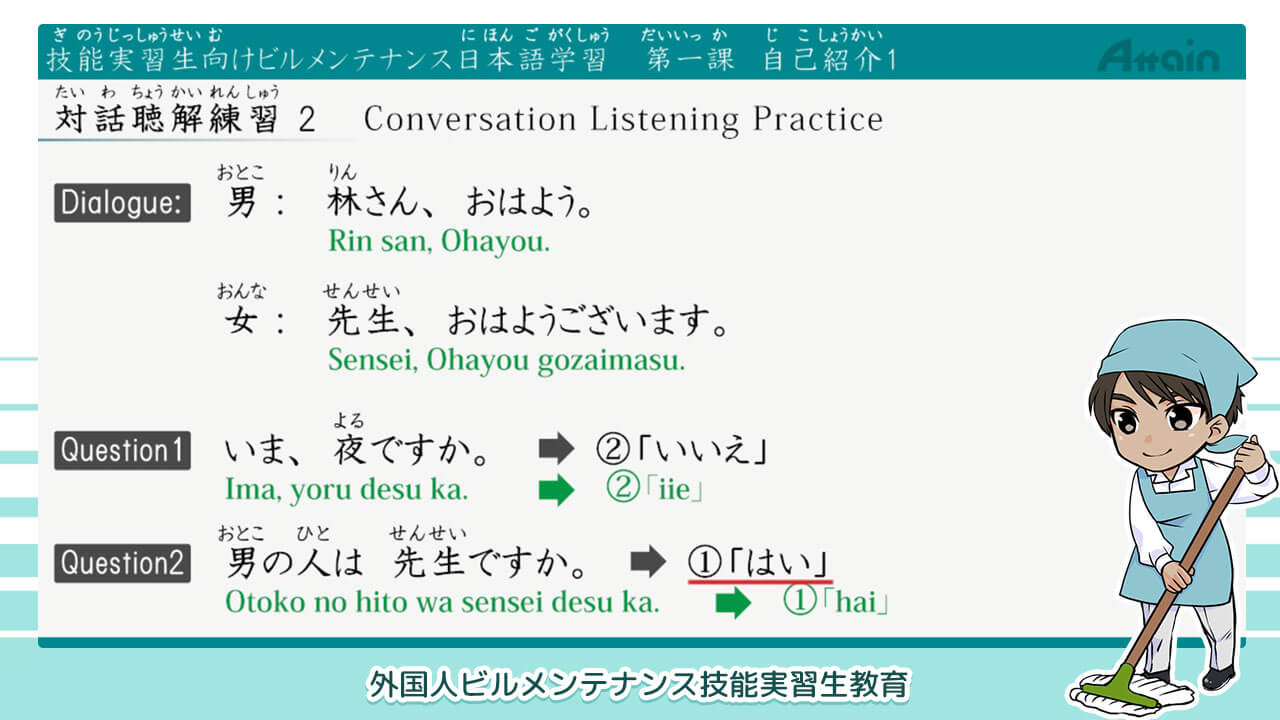
Building Maintenance Japanese for Technical Intern Trainees (also known as Building Cleaning Japanese for Technical Intern Trainees)" is a video-based Japanese language learning material developed for foreign technical intern trainees who wish to acquire building cleaning skills.
The materials are provided via e-Learning, making it possible for trainees to study even during their busy work schedules. In addition, if used by a company or organization, an administrator account can be issued to check the progress of the learners.
Curriculums
- Lesson 1Self-introduction1
- Lesson 2Self-introduction 2
- Lesson 3Introducing the company president
- Lesson 4Birthplace
- Lesson 5Occupation
- Lesson 6The first day of working in Japan
- Lesson 7Observing work
- Lesson 8Start Cleaning Work
- Lesson 9Daily Cleaning
- Lesson 10Living in The Dormitory
- Lesson 11Periodic Cleaning
- Lesson 12Window Wiping
- Lesson 13Telephone Number
- Lesson 14Notification of Schedule
- Lesson 15How to count things
- Lesson 16Working hours
- Lesson 17Work in progress
- Lesson 18The new workshop
- Lesson 19Stating one’s desire
- Lesson 20Notifying a plan
- Lesson 21Summary-Shopping